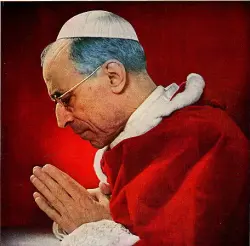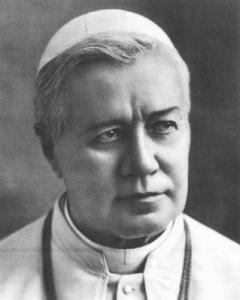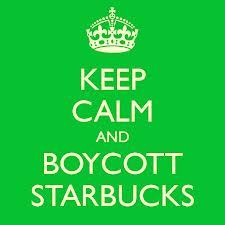Annulments Now And Then
I suggest a small exercise. Let us look back at the history of the Church, and reflect on annulments now and then.
It may have been that annulment procedures were simpler than before Francis' “reform” in, say, A.D. 822. But how many people asked for annulments, and for which reasons? My take would be: very, very few, and for very valid reasons, like non consummation and strong cohercion. It does not need a genius (actually, it only needs a Catholic) to understand that flimsy and bendable, internal circumstances like the faith or lack thereof of the other spouse, or the “intention” not to have children, played absolutely no role in any way, shape or form; not in the procedure, certainly not in the decision.
Notabene: in those years civil divorce was unknown.
It appears in the XVIII Century there was an increase in annulment proceedings, and with it the necessity to better regulate the matter in order to avoid abuses. Again, you see how the Church works: it is the sacrament that must be protected. The plight of the man who has freely chosen to marry a slut is his private cross, but it is certainly nowhere to be found as a reason to “find him a way out”, much less call this sacrilege “mercy”.
Then divorce came into the West. The heretical dams broke in the United States, then in England and in the rest of the Empire. By the Sixties divorce was so common film comedies were made around it.
Notabene again: as divorce in civil society became common, a perception of “unjust suffering” of the by now fully secularised “c”atholic masses became common. In the Seventies, Francis-like “provisional” reforms battered the Sacrament incessantly, with hundreds of thousands of annulments. The Catholics of A.D. 822 would have already refused to call this world “Catholicism”. To them, it would have been a kind of heretical Mars.
Francis is the fully secularised continuation of this fully secularised thinking. In the mind of Francis the convenience (called “mercy”) comes first, and the Sacrament second. Why? I don't know exactly. Because it's convenient. Because it makes him popular. Because he does not believe in God. Because he hates Him, perhaps. Most certainly, he hates the Church. He has just no intention of defending the sacrament. Heck, he believes a very vast number of them are not valid anyway! There is nothing in his way of thinking that would have indicated a catholic approach to his progenitors. They would just not have recognised his thinking, or him, as Catholic. There is no past age of the Church in which one like Francis would not have been seen as a dangerous heretic and enemy of the Church in his thinking, speaking and acting.
For centuries, one made his bed and then had to lie in it. Personal responsibilities were taken seriously. Catholicism was taken even more seriously. Sacraments were taken extremely seriously.
In Francis' NuChurch, no one has to bear responsibility for any decision. Everyone has the right to the emergency exit. Catholicism is a problem. Francis is the solution.
You will look in vain, in the history of the Church, for any Catholic thinking of the Sacrament as Francis does, much less legislating about it as he has just done.
This may be something “positive” for a Libtard.
For a Catholic, it's all he needs to know about this Pope.
M
Posted on September 18, 2015, in Catholicism, Conservative Catholicism, Traditional Catholicism and tagged easy annulment. Bookmark the permalink. 1 Comment.




















Excellent history and especially conclusions, Mundabor. Here is a portion of today’s epistle which lets us know what Christ thinks about Pope Francis actions:
1 Tim 6:2c-12.
Beloved: Teach and urge these things. Whoever teaches something different and does not agree with the sound words of our Lord Jesus Christ and the religious teaching
is conceited, understanding nothing, and has a morbid disposition for arguments and verbal disputes. From these come envy, rivalry, insults, evil suspicions, and mutual friction among people with corrupted minds, who are deprived of the truth, supposing religion to be a means of gain.
Michael Dowd